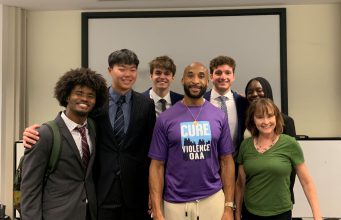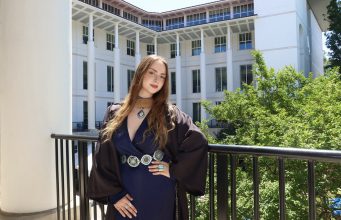Each year, BBA students at Goizueta participate in the “BComm” course designed to strengthen their communications techniques and introduce them to the skills required to prepare for and deliver client presentations.
The defining moment of the BBA program’s Business Communication Strategy or “BComm” course is the end-of-semester Professional Communications Strategy Case Competition. This past spring, executives from Mercedes-Benz USA (MBUSA) asked three-dozen BComm student teams how they would introduce Mercedes-EQA, the automaker’s new, all-electric crossover SUV, to Gen Z consumers (those born between 1995 and 2010). Headquartered in Atlanta, MBUSA is responsible for the distribution, marketing, and customer service for all Mercedes-Benz products in the U.S.
Over the course of a month, the student teams worked on their presentations for MBUSA. The teams then presented their strategies to their BComm professors—Molly Epstein, professor in the practice of Organization & Management, Nikki Graves, associate professor in the practice of Organization & Management, and Daphne Schechter, senior lecturer of Organization & Management. The professors then chose five teams to advance to the final presentation.
One of Graves’ student teams, “The Game(s) of Reaching Gen Z,” took a calculated risk—one that would ultimately result in the team commanding first place in the competition. Rather than present a more typical, multi-pronged communication strategy, the team committed to a singular approach—gaming.
“The team’s ideas were really creative and different. However, their argument had holes,” said Graves. She told The Game(s) team that she’d send it forward as a finalist if the students were willing to work to improve their presentation.
However, when Graves had the team deliver its revised presentation on the afternoon before the competition, it did not meet her expectations. “I was seconds away from pulling them from the competition,” said Graves.
Face an Obstacle, Overcome It, and Shine
Graves gave the students a choice. Either fail to overcome an obstacle and learn from the experience, or “face an obstacle, overcome it, and shine,” she said. When one of the students asked what it would take for Graves to keep the team in the competition, Graves told them that by midnight, she’d need to see a presentation that incorporated the arguments and presentation skills she’d asked for. The students took the challenge and agreed to meet with Graves a mere five hours later.
“By 11pm, they had pulled that thing apart and put it back together again, and when they ran through it, it was spectacular,” said Graves. “One factor that distinguishes Goizueta students is their unfathomable determination in overcoming challenges.”
“It was definitely a little nerve-wracking,” said Zach Cohen 23BBA, a member of The Game(s) team. “She was really proud of us and that was super encouraging and an awesome moment.”
In the past, Mercedes-Benz has integrated its vehicles into lifestyle games such as The Sims, Mario Kart, and others. “The Game(s)” team’s approach was to build on that. “We were looking for unique ways to reach Gen Z and that was the gaming market,” noted Marawan Elgohry 23BBA. While some Game(s) team members were avid gamers, others, like Sadie Schwartz 23BBA and Zach Feldman 23BBA were not.
Schwartz and Katherine Dong 23BBA wanted to incorporate Mercedes-Benz’ reputation as a luxury brand into the mix. This posed a problem. “Gamers don’t have reputations as buying luxury,” said Dong. When Schwartz discovered an article describing how luxury brands such as Louis Vuitton and Marc Jacobs used gaming to market their products, it all came together. In addition to showcasing Mercedes-EQA as a “taste of luxury” in its presentation, the team also advocated that MBUSA highlight the vehicle’s “clean speed” in racing games such as Forza and Rocket League.
Every team in the finals suggested leveraging social media influencers on platforms such as TikTok or Instagram, but The Game(s) team took the idea a step further. It suggested that MBUSA advertise on the gaming site Twitch, as well as partner with eSports outlets such as League of Legends. Doing so, noted Elgohry during the presentation, would provide “substantial ROI just by participating” in the rapid growth of the gaming industry.
“My team’s greatest strength was their consistent collaboration,” noted Prisca Sielaff 22BBA, the team’s student coach who had competed in the BComm case competition in 2020. “That allowed them to create an innovative, novel solution for MBUSA.”
The MBUSA executives—Doug Robertson, Brand Strategy Lead, Jim Edwards, EQ Product Manager, Jordan Lalor, Senior Social Media Specialist, along with Jennifer Steele, GVP, Managing Partner, SapientRazorfish, and Drummond Berman, Group Creative Director, Merkley + Partners—agreed. “People pay a good amount of money for games, and if you don’t do it right, any sort of marketing can be seen as a real intrusion,” Berman told Team Game(s) after its presentation. “What I liked is that you’ve justified your presence there by actually using the benefits of this vehicle.”
“Just the mention of media impressions and ROI and those KPIs—that’s very much what we do in the real world with every campaign,” Robertson saidas he announced that the executives had chosen The Game(s) as the winner of the competition. “You really applied that realistic professional filter, so job well done.” The executives also gave the team kudos for its emphasis on Mercedes-Benz being a luxury brand.
Creative Growth Strategies for Gen Z Buyers Impressed Executives
Other strategies included Team Hear/Learn/Play with the EQA’s advice to launch a blog on Instagram and to create documentary-type films for Netflix and YouTube. The Natural Habitat of EQA team suggested MBUSA act as an official sponsor of Coachella, the annual, multi-day, music and arts festival in California, where celebrities and artists would be shuttled between venues in a Mercedes EQA.
Team The Car That Gen Z Built and team The EQ Way, which the MBUSA executives chose as runners up in the case competition, both noted the lack of electric vehicle charging infrastructure in the U.S. and recommended establishing a partnership with ChargePoint, an electric vehicle charging company. Additional strategies included the creation of a financial or “environmental impact calculator” to make EQA owners “feel proud of the unique and tangible impact” they were having on the environment, noted Eve Abraham 23BBA during The EQ Way team’s presentation.
Like the Game(s) team, team EQ Way had a story of its own. Earlier in the semester, differing communication styles kept the team from meshing. With hard work and the help of Graves and the team’s teaching assistant and coach Leigh Holbrook, The EQ Way team overcame its issues.
“The students went well beyond the foundational communication skills we taught in class. They evolved and bonded as a creative team, successfully traversed every challenge, integrated feedback, and really tapped into their collective creative genius,” saidHolbrook. “Their success came from recognizing and embracing the value of their collaborative vision.”
“For me, the most important take away will be playing your role in any team to the best of your ability, and that means learning what exactly your role is and how to execute it,” explained “EQ Way” team member Grant d’Adesky 23BBA.
“When you trust your teammates and have confidence in them, you can really elevate your project and make it so the result is something better than what we could have done individually,” explained Lia Rubel 23BBA, a member of The EQ Way team. “I feel like I grew in so many ways—especially working on a team where everybody brings in unique skills and knowledge. I learned from everyone here and all my teammates. It was really cool to see myself and everyone grow throughout the project.” Looking back on the competition, Graves felt good about her decision to push her students to do better. “The communication strategy that we teach in 365 (the BComm course) rests on pillars of critical thinking skills, such as the analysis, interpretation, and evaluation of data. Students learn to create and evaluate inferences, and to explain their ideas clearly,” she said. “These two teams further demonstrated the ability to self-reflect, which allowed them to step away from emotional and stressful situations and evaluate how they could better perform.”
Our BBA students bring structured problem solving and communication skills to address real-world challenges. What problems can we help your organization solve? To learn more, please email Darius.Woody@emory.edu, director of corporate relations for Goizueta Business School.











